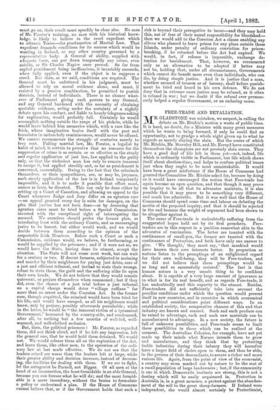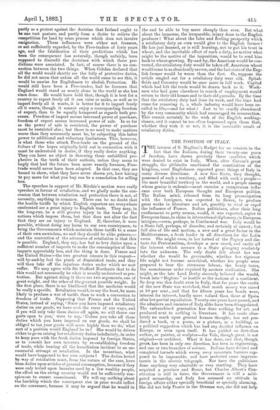FREE-TRADE AND RETALIATION.
MR. GLADSTONE was mistaken, we suspect, in calling the debate on Mr. Ritchie's motion a waste of public time. It is hard, no doubt, for a Minister with many great measures which he wants to bring forward, if only he could find an opportunity, not to grudge a whole night given up to what he regards as merely slaying the slain. But the errors of which Mr. Ritchie, Mr. Staveley Hill, and Mr. Ecroyd have constituted themselves the champions are not precisely slain errors. They have a good deal of life left in them yet—not, indeed, life which is ordinarily visible in Parliament, but life which shows itself about election-time, and helps to confuse political issues just when they ought to be most unmistakable. It would have been a great misfortune if the House of Commons had granted the Committee Mr. Ritchie asked for, because by doing so it would have encouraged the notion that Free-trade has again become an open question, and that though it may prove on inquiry to be all that its advocates maintain, it is also possible that it may prove to be something very different, and much less admirable. But it was well that the House of Commons should spend some time and labour on debating the merits of the proposed inquiry, and that it should be rejected in the end because the weight of argument had been shown to be altogether against it.
The cause of Free-trade is undoubtedly suffering from the exaggerated hopes held out by its first preachers. Free- traders are in this respect in a position somewhat akin to the advocates of vaccination. The latter are taunted with the continuance of small-pox, the former are taunted with the continuance of Protection, and both have only one answer to give. We thought,' they must say, 'that mankind would have known their own interests better. In proportion as nations listen to the promptings of an enlightened regard for their own well-being, they will be Free-traders, and we did not believe that these promptings would be so long and so successfully resisted.' The fact is that human nature is a very unsafe thing to be confident about. It is capable of a very large amount of ignorance as to what is for its real benefit, and as regards Free-trade, it has undoubtedly used this capacity to the utmost. Besides, Free-traders did not sufficiently take into account the peculiar conditions under which the question would present itself in new countries, and in countries in which economical and political considerations point different ways. In an established society, the comparative chances of this and that industry are known and assured. Such and such produce can be raised to advantage, such and such raw materials can be manufactured to advantage. In a new society, the future is full of unknown possibilities, and Free-trade seems to limit these possibilities to those which can be realised at the moment. The Australian Colonies, for example, have not yet made up their minds what Nature intends them to grow and manufacture, and they think that by protecting feeble industries during their infancy they will hereafter have a larger field of choice open to them, and thus be able, in the persons of their descendants, to secure a richer and more various life. Again, from the point of view of the economist, a country may seem marked out by nature to be the seat of a small population of large landowners ; but, if the community is one in which Democratic instincts are strong, this is not a destiny which will be easily acquiesced in. Protection in Australia is, in a great measure, a protest against the abandon- ment of the soil to the great sheep-farmers. If Ireland were independent, she would almost certainly be Protectionist, partly as a protest against the doctrine that Ireland ought to be one vast pasture, and partly from a desire to relieve the competition for land by some process which does not involve emigration. These influences were either not foreseen, or not sufficiently regarded, by the Free-traders of forty years ago, and the falsification of their predictions which has been the consequence has naturally, though unfairly, been supposed to discredit the doctrines with which these pre- dictions were associated. In fact, of course there is no con- nection between the two things. When Cobden declared that all the world would shortly see the folly of protective duties, he did not mean that unless all the world came to see this, it would be unwise for Englishmen to abolish Protection. He would still have been a Free-trader, had he foreseen that England would stand as nearly alone in the world as she has since done. He would have held that, though it is best for a country to export freely all it can raise or make, as well as to import freely all it wants, it is better for it to import freely all it wants, though it cannot enjoy a corresponding freedom of export, than to be equally hampered as regards both pro- cesses. Freedom of import means increased power of purchase, freedom of export means increased power of sale. In so far as the power of sale is restricted, the power of purchase must be restricted also ; but there is no need to make matters worse than they necessarily must be, by subjecting this latter power to additional and voluntary limitations. This, however, is what those who attack Free-trade on the ground of the failure of the hopes originally held out in connection with it must be understood to desire, if they really desire anything. They can have no object in throwing these unfulfilled pro- phecies in the teeth of their authors, unless they mean to imply that had the future been more exactly foreseen, Free- trade would never have been adopted. In that case, they are bound to show, what they have never shown yet, how having to pay more for what you buy can be a consolation for selling less.
The speeches in support of Mr. Ritchie's motion were really speeches in favour of retaliation, and we gladly make the con- cession that between retaliation and protection there is not, of necessity, anything in common. There can be no doubt that the hostile tariffs by which English exporters are everywhere confronted are a great injury to English trade. They may, in the long-run, be a still greater injury to the trade of the nations which impose them, but that does not alter the fact that they are an injury to England. If, therefore, it were possible, without doing any harm to our own countrymen, to bring the Governments which maintain these tariffs to a sense of their own unwisdom, we and they should be alike gainers,— and the contention of the advocates of retaliation is that this is possible. England, they say, has but to levy duties upon a sufficient number of imports to make the consumption of these imports appreciably less, and the thing is done. France and the United States—the two greatest sinners in this respect— will by-and-by feel the pinch of diminished trade, and they will then take off the injurious duties under which we now suffer. We may agree with Sir Stafford Northcote that to do this would not necessarily be what is usually understood as pro- tection. But against doing it there are two arguments, one of great weight, and the other of the greatest possible weight. In the first place, there is no likelihood that the medicine would be really a specific. Retaliation would, to say the least, be more likely to produce a war of tariffs than to work a conversion to freedom of trade. Supposing that France and the United States, instead of saying, Since you have imposed retaliatory duties on our goods, we have seen the error of our ways, and if..you will only take these duties off again, we will throw our ports open to you,' were to say, 'Unless you take off these duties which you have imposed on our goods, we shall be obliged to tax your goods still more highly than we do,' what sort of a position would England be in ? She would be driven either to go on raising her retaliatory duties indefinitely, in order to keep pace with the fresh duties imposed by foreign States, or to consult her own interests by re-establishing freedom of trade, while bearing all the humiliation incident to an un- successful attempt at retaliation. In the meantime, what would have happened to her own subjects ? The duties levied by way of retaliation must, from the nature of the case, have been duties upon articles of general consumption, because if they were only levied upon luxuries used by a few wealthy people, the effect on the erring country would not be sufficiently con- spicuous to ensure amendment. We will say nothing about the hardship which the consequent rise in price would inflict on the consumer, because it may be argued that he would in
the end be able to buy more cheaply than ever. But what about the immense, the irreparable, injury done to the English producer ? What about the false and fleeting prosperity which a retaliatory duty on corn would give ta the English farmer ? He has just learned, or is still learning, not to put his trust in wheat, and the inevitable effect of such a duty, no matter what might be the motive of the imposition, would be to send him back to wheat-growing. By-and-by, the American would be con- verted, the retaliatory duty would be taken off, American wheat would come in as abundantly as ever, and the last state of the Eng- lish farmer would be worse than the first. Or, suppose the article singled out for a retaliatory duty were silk. Spital- fields and Coventry would be once more in full work. Capital which had left the trade would be drawn back to it. Work- men who had gone elsewhere in search of employment would return to their old homes and to their old pursuits. By the time that the retaliatory duty had done its work, and the time had come for removing it, a whole industry would have been re- called to life,—and for what ? Just to be cruelly abandoned by the very community which had encouraged its resurrection. This cannot certainly be the wish of the English working_ classes, and it cannot be too of Len impressed upon them that, whether they wish it or not, it is the inevitable result of retaliatory duties.















































 Previous page
Previous page